Nigeria bombings: 'Death toll passes 100'
- Published
The BBC's Will Ross: "For the last two years Jos has been fairly free of attacks"
The bodies of at least 118 people have now been recovered from the sites of twin bombings in the central Nigerian city of Jos, the nation's emergency management agency says.
The first blast was in a busy market, the second outside a nearby hospital.
No group has said it was behind the attack but Boko Haram militants have carried out a spate of recent bombings.
Jos has also seen deadly clashes between Christian and Muslim groups in recent years.
A spokesperson for the regional governor told AFP news agency that most of the victims were women. The market and bus terminal are part of the commercial centre of Jos.
The second blast was some 30 minutes after the first and killed some rescue workers.
Journalist Hassan Ibrahim told the BBC that tension was rising in the area, with youths blocking some roads. Religious leaders are appealing for calm.
National Emergency Management Agency coordinator Mohammed Abdulsalam said: "We've now recovered 118 bodies from the rubble. This could rise by morning, as there is still some rubble we haven't shifted." He said 56 people were injured.

Analysis by Will Ross, BBC News, Abuja
Once again the explosions were meant to cause as many casualties as possible. Like the recent Abuja blasts, the victims are of different religions and were mainly people out on the streets struggling to earn a living.
It has been almost two years since the last attack on Jos - when several churches were bombed. Those attacks were seen as an effort by Boko Haram to spark clashes between Christians and Muslims in the often volatile Middle Belt region of Nigeria.
For more than 10 years this area has been the scene of violent clashes that have often been portrayed as religious conflicts even though they are rooted in competition over land, power and resources. There is, however, a risk that these latest bombings will spark reprisal clashes and religious leaders have appealed for calm.

The BBC's Muhammad Kabir Muhammad in the capital Abuja says witnesses at a hospital in Jos saw bodies being brought in that were burned beyond recognition.
A student in Jos, Ayo Tumbe Omeiza, told the BBC: "The second blast was close to me. I tried to get to my car. I was asking for help. I saw a lot of dead people. After the blast people could not stop panicking. People were driving in all directions."
BBC News examines the challenges facing Nigeria's president, in 60 seconds
President Goodluck Jonathan condemned the attack as a "tragic assault on human freedom".
"President Jonathan assures all Nigerians that the government remains fully committed to winning the war against terror and... will not be cowed by the atrocities of enemies of human progress and civilisation," his office said.
Although Boko Haram has previously targeted Jos, the capital of Plateau state, the city has been relatively calm for almost two years.
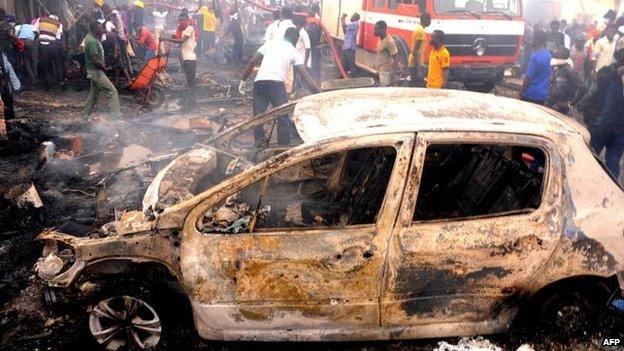
No-one has yet said they carried out the attack
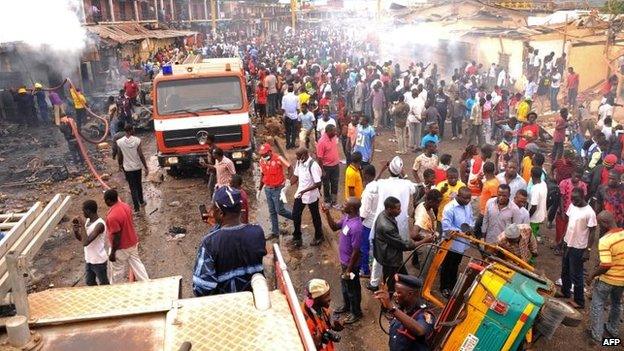
The market was said to have been very busy - with many women among the victims
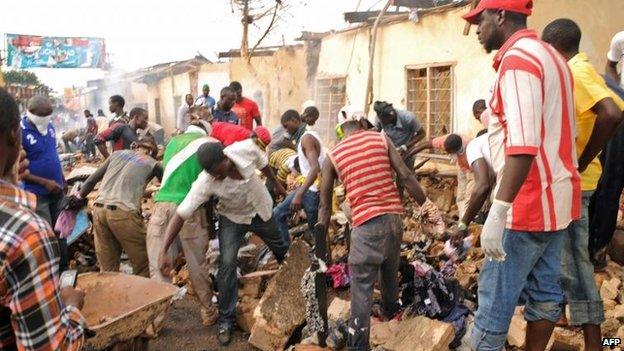
Shopkeepers salvage belongings after the attack
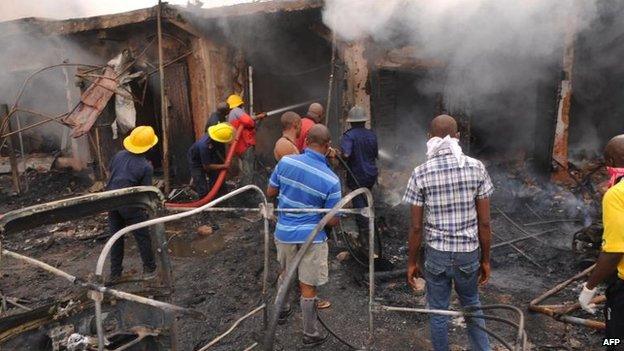
There are fears the death toll could still rise
Plateau state lies on the fault-line which divides Nigeria's largely Muslim north from its mainly Christian south.
The state has witnessed violence blamed on land disputes between semi-nomadic Muslim Fulani herdsmen and mainly Christian Berom farmers.
States of emergency
The Nigerian government is also currently trying to trace more than 200 girls captured by Boko Haram in April from a boarding school in the north-eastern town of Chibok.
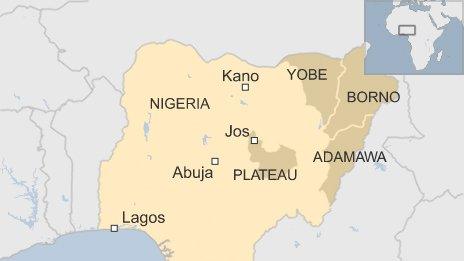
The case has shocked the world and prompted foreign powers to send military advisers to assist Nigeria's army.
On Tuesday, parliament approved a six-month extension of a state of emergency in three north-eastern states - Adamawa, Borno and Yobe.
More than 1,000 people have been killed in Boko Haram attacks this year.
Boko Haram is fighting to overthrow the government and create an Islamic state.
Nigeria's violence is not confined to the north.
This month a car bomb in the capital Abuja killed at least 19 people and injured 60 more.
The explosion happened close to a bus station where at least 70 people died in a bomb blast on 14 April.